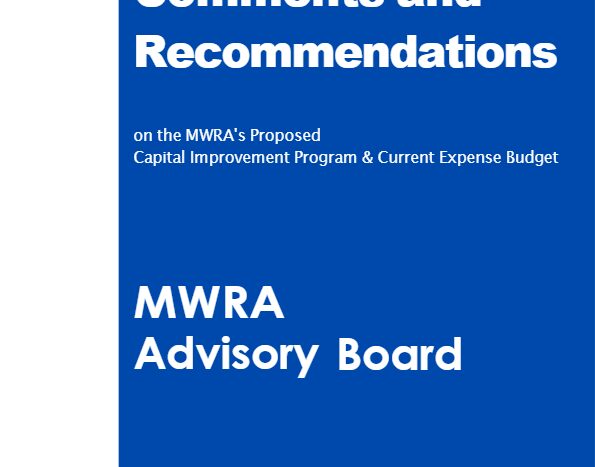TL;DR – What You Need to Know
- The Advisory Board recommends lowering MWRA’s proposed FY26 rate increase from 2.98% to 2.70%, through $5.8M in targeted expenditure reductions.
- Key recommendation: Bring back the Long-Term Rates Management Committee (LTRMC) to connect capital pacing, rate forecasting, and long-term obligation planning.
- Operating surplus? Use it with purpose: redirect vacancy-driven savings to Pension/OPEB, or budget transparently for pre-payment of debt.
- Support capital priorities like Metro Tunnel Redundancy—but push for smart pacing and affordability analysis.
- Revamp CSO strategy to ensure dollars are going where they deliver real environmental and financial benefit.
- Mind the gap: Water assessments are rising faster than sewer. That needs to change.
- We strongly oppose H.897/S.447—a bill that shifts massive costs onto MWRA ratepayers with no benefit to the communities paying them.
- Protect the filtration waiver: Restore DCR Ranger enforcement and maintain active forest management.
- It’s MWRA’s 40th anniversary—time to celebrate what’s worked, and recommit to what’s next.
40 Years of Partnership, Policy, and Progress:
The Advisory Board’s FY26 Recommendations Build on a Legacy of Long-Term Stewardship
Fiscal year 2026 marks the 40th anniversary of the MWRA’s enabling legislation—and with it, four decades of collaboration between the Authority and the Advisory Board. Since 1985, the Advisory Board has served as the voice of ratepayers across 60 cities and towns, ensuring that decisions about spending, infrastructure, and policy are made not just for today, but for the decades ahead.
Over those forty years, we’ve seen enormous victories:
The transformation of Boston Harbor from a national embarrassment into a global model of urban clean water recovery.
- The preservation of pristine, forest-filtered water supplies—protected without the need for costly filtration plants.
- The evolution of MWRA into one of the most stable and predictable regional systems in the country, with consistent AAA bond ratings and multi-year financial planning frameworks.
These are no small feats. And they didn’t happen by accident.
They happened because of long-range thinking. Because of collaborative governance. Because the MWRA, its staff, and its member communities—including the Advisory Board—chose to focus not only on compliance, but also on capacity; not only on cost control, but also on value.
FY26: Steady Rates, Growing Pressures
This year’s proposed FY26 budget from MWRA reflects a 2.98% increase in the combined assessment—a stable figure in the face of rising personnel costs, multi-billion-dollar capital projects, and evolving regulatory challenges.
The Advisory Board recommends a net reduction of $2.46 million, resulting in a revised combined increase of 2.70%. This was achieved through $5.8 million in recommended reductions, offset by MWRA’s own spring revisit updates.
But more importantly, this year’s Comments & Recommendations focus not only on the numbers, but on the systems behind the numbers—the assumptions, policies, and frameworks that shape how the MWRA plans for its future.
Reconnecting Strategy to Spending: Bring Back the LTRMC
A core recommendation this year is the reconvening of the Long-Term Rates Management Committee (LTRMC). Historically, this committee helped coordinate capital planning, rate modeling, and long-range forecasting. We believe it’s time to bring that structure back.
Why?
Because this year’s budget touches on every corner of long-term rate stability:
Capital pressures are growing, with Metro Tunnel Redundancy and CSO program updates advancing in tandem.
- Surpluses in personnel and fringe benefit spending continue, raising transparency questions about how those dollars should be treated.
- The rate of increase between water and sewer assessments is diverging—creating pressure on local budgets even when the combined rate remains stable.
Each of these issues is complex. Each would benefit from deeper, structured analysis. The LTRMC can help.
Budget Transparency: Purpose-Aligned Use of Surpluses
MWRA’s operating budget again includes full funding for all staff positions—despite year-over-year vacancy trends that leave millions unspent in the Wages, Salaries, and Fringe Benefits lines. This year, the Advisory Board made only modest reductions to those categories—but paired those adjustments with a clear recommendation:
If dollars are raised for employee wages and benefits but not used, they should be redirected to related long-term liabilities like Pension and OPEB.
If MWRA prefers not to redirect, then the line items should be right-sized, and any intentional surplus should be transparently presented as a pre-payment of debt—not hidden inside inflated personnel budgets. This isn’t just a fiscal detail—it’s about trust and transparency.
Capital Planning and CSO: Prioritize What Works
MWRA is entering an era of capital investment not seen since the original construction of Deer Island and the metro water tunnels. The Advisory Board supports the vision—but calls for deliberate pacing, clearer affordability metrics, and a value-driven CSO strategy.
Our CSO policy recommendation emphasizes the need for:
Cost-effective solutions that deliver meaningful water quality improvements;
- Avoiding overengineered fixes with limited environmental return; and
- Making sure each dollar spent improves the system for everyone—not just to satisfy outdated mandates.
Water vs. Sewer: It’s Not Just the Combined Rate
The MWRA emphasizes the combined assessment rate—but communities budget separately for water and sewer. In recent years, the rate of increase for water assessments has outpaced sewer, even though sewer service remains more expensive overall.
The Advisory Board is calling for a more balanced rate trajectory across both utilities. It’s not a fairness issue—it’s a practical one. Communities benefit from parity, not lopsided growth between their two enterprise funds.
Standing Up for MWRA Communities: Rejecting H.897/S.447
The Advisory Board is firmly opposed to H.897/S.447, a bill that would extract tens of millions of dollars from MWRA ratepayers to benefit a small set of Quabbin-area communities.
The legislation:
Imposes new, unjustified annual costs on MWRA communities;
- Proposes changes to MWRA’s governance structure, disregarding the carefully balanced Board composition that has been central to the Authority’s 40-year track record of success; and
- Ignores the fact that MWRA ratepayers have already invested over $850 million in watershed protection—including PILOT payments, land acquisition, and local grants benefiting these same Quabbin communities.
Adding new burdens to the communities already funding the system isn’t equity—it’s overreach.
We urge MWRA and state leaders to reject this bill and protect the integrity of the system we’ve all built together.
Protecting the Filtration Waiver: A Policy Worth Defending
Two policy fronts continue to threaten the system’s filtration waiver:
- Loss of enforcement authority for DCR Rangers in MWRA’s watershed lands; and
- Proposals to halt active forestry, despite its proven role in maintaining healthy, resilient forest ecosystems.
Together, these issues jeopardize the integrity of the source waters. If the waiver were lost, MWRA ratepayers could face hundreds of millions in new construction and operational costs—alongside increased greenhouse gas emissions.
Protecting the waiver isn’t optional—it’s essential.
Forty Years In—and Still Looking Ahead
The past forty years have shown what’s possible when technical excellence is paired with public accountability. The MWRA Advisory Board is proud of the role it has played—not just as a reviewer of budgets, but as a long-term steward of one of the country’s best public utility systems.
This year’s recommendations build on that legacy.
We thank MWRA staff and leadership for forty years of partnership—and we look forward to continuing this work in the decades to come.

